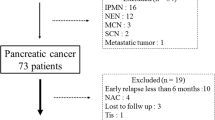Abstract
Aims
We previously demonstrated that body weight loss (BWL) at one month after gastrectomy, a common finding after surgery for gastric cancer, was an independent risk factor for the continuation of adjuvant chemotherapy with S-1. However, it is unclear whether BWL after gastrectomy leads to poor survival through poor compliance to adjuvant chemotherapy with S-1.
Methods
We conducted this follow-up study in the same cohort as our previous study. Overall survival (OS) and recurrence-free survival (RFS) were examined in 103 patients who underwent curative D2 surgery and were pathologically diagnosed with stage II or III gastric cancer, and who received postoperative adjuvant chemotherapy with S-1 between June 2002 and December 2011.
Results
The median follow-up period was 64.3 months. The 5-year OS rate in the patients with a BWL of <15% was 59.9%, while that in the patients with a BWL of ≥15% was 36.4% (p = 0.004). Univariate and multivariate analyses for OS demonstrated that pathological T factor and BWL were significant risk factors. On the other hand, the 5-year RFS rate was 56.4% in the BWL <15% group and 36.4% in the BWL ≥15% group (p = 0.016), while univariate and multivariate analyses for RFS demonstrated that BWL was a marginally significant risk factor.
Conclusions
Severe postoperative BWL, which is closely related with poor S-1 compliance, is an important risk factor for survival. It merits testing if preventing BWL improves survival of gastric cancer patients who receive S-1 adjuvant chemotherapy.



Similar content being viewed by others
References
Torre LA, Bray F, Siegel RL et al. (2015) Global cancer statistics, 2012. CA Cancer J Clin 65:87–108
Sakuramoto S, Sasako M, Yamaguchi T et al (2007) Adjuvant chemotherapy for gastric cancer with S-1, an oral fluoropyrimidine. N Engl J Med 357:1810–1820
Bang YJ, Kim YW, Yang HK et al (2012) Adjuvant capecitabine and oxaliplatin for gastric cancer after D2 gastrectomy (CLASSIC): a phase 3 open-label, randomised controlled trial. Lancet 379:315–321
Cunningham D, Allum WH, Stenning SP et al (2006) Perioperative chemotherapy versus surgery alone for resectable gastroesophageal cancer. N Engl J Med 355:11–20
Schuhmacher C, Gretschel S, Lordick F et al (2010) Neoadjuvant chemotherapy compared with surgery alone for locally advanced cancer of the stomach and cardia: European Organisation for Research and Treatment of Cancer randomized trial 40954. J Clin Oncol 28:5210–5218
Macdonald JS, Smalley SR, Benedetti J et al (2001) Chemoradiotherapy after surgery compared with surgery alone for adenocarcinoma of the stomach or gastroesophageal junction. N Engl J Med 345:725–730
Aoyama T, Yoshikawa T, Shirai J et al (2013) Body weight loss after surgery is an independent risk factor for continuation of S-1 adjuvant chemotherapy for gastric cancer. Ann Surg Oncol 20:2000–2006
Bonadonna G, Valagussa P (1981) Dose-response effect of adjuvant chemotherapy in breast cancer. N Engl J Med 304:101–105
Ryan AM, Reynolds JV, Healy L et al (2009) Enteral nutrition enriched with eicosapentaenoic acid (EPA) preserves lean body mass following esophageal cancer surgery: results of a double-blinded randomized controlled trial. Ann Surg 249:355–363
Japanese Gastric Cancer Association (2011) Japanese classification of gastric carcinoma: 3rd English edition. Gastric Cancer 14:101–12
Japanese Gastric Cancer Association (2011) Japanese gastric cancer treatment guidelines 2010 (ver. 3). Gastric Cancer 14:113–123
Yamada T, Hayashi T, Cho H et al (2012) Usefulness of enhanced recovery after surgery protocol as compared with conventional perioperative care in gastric surgery. Gastric Cancer 15:34–41
Tsuburaya A, Yoshida K, Kobayashi M et al (2014) Sequential paclitaxel followed by tegafur and uracil (UFT) or S-1 versus UFT or S-1 monotherapy as adjuvant chemotherapy for T4a/b gastric cancer (SAMIT): a phase 3 factorial randomised controlled trial. Lancet Oncol 15:886–893
Andreyev HJ, Norman AR, Oates J et al. (1998) Why do patients with weight loss have a worse outcome when undergoing chemotherapy for gastrointestinal malignancies? Eur J Cancer 34:503–509
Migita K, Takayama T, Saeki K et al (2013) The prognostic nutritional index predicts long-term outcomes of gastric cancer patients independent of tumor stage. Ann Surg Oncol 20:2647–2654
Acknowledgements
This work was supported, in part, by the non-governmental organization, Kanagawa Standard Anti-cancer Therapy Support System, Uehara Memorial Foundation, the Yasuda Medical Foundation, and Takeda Medical Foundation. The authors express their sincere gratitude to Ms. Yuka Fujita, Ms. Natsumi Sato, and Ms. Rika Takahashi for their excellent data management in this study.
Author information
Authors and Affiliations
Corresponding author
Ethics declarations
Conflict of interest
The authors declare no conflicts of interest in association with the present study.
Additional information
T. Aoyama and T. Yoshikawa contributed equally to this study.
About this article
Cite this article
Aoyama, T., Sato, T., Maezawa, Y. et al. Postoperative weight loss leads to poor survival through poor S-1 efficacy in patients with stage II/III gastric cancer . Int J Clin Oncol 22, 476–483 (2017). https://doi.org/10.1007/s10147-017-1089-y
Received:
Accepted:
Published:
Issue Date:
DOI: https://doi.org/10.1007/s10147-017-1089-y




